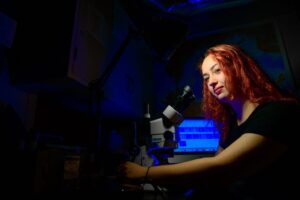2/3 of all departments conduct sustainability-related research and scholarship
Many professors offer unique research projects related to sustainability issues such as biodiversity, food justice, water, sustainable construction, and more. Check out some recent research highlights below:
- Melanie Acosta ’25, Ariana Welch ’26 and Camille Voo ’26, studied food justice in the local Easton community, exploring socio-economic structures, lived experiences and community action. This interdisciplinary research was guided by Ernest Nkansah-Dwamena, assistant professor in environmental studies, Rui Jie Peng, assistant professor in anthropology and sociology, and Rohan Prabhu, assistant professor in mechanical engineering.
- Olivia Najjar ’23 studied and mapped microplastics within beach sands across North America, under guidance of David Sunderlin associate professor and department head of geology. Olivia is an environmental studies major with a minor in geology.
- With students involved across multiple majors, Lafayette helped research and support Bushkill Creek’s restoration with the removal of dams to allow for the return of freshwater mussels. Professors involved included Megan Rothenberger ’02, associate professor of biology and chair of environmental programs, Hongxing Liu, assistant professor of economics, Dru Germanowki, professor of Geology, David Brandes, professor of civil and environmental engineering, among others.
- Over 50 faculty are conducting research and scholarship in themes of sustainability from infrastructure, to social justice, to environmental conservation. Explore the catalogue of faculty conducting sustainability research and their topics of focus.
Learn more about research projects offered at Lafayette.
